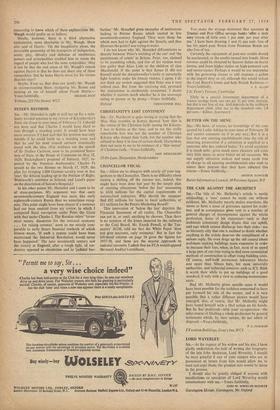SIR,—Mr. Henschel is right to pull me up for a
care- lessly worded sentence in my review of Klyuchevsky's Peter the Great in your issue of February 13. I should eiot have said that Charles 1 would have liked to rule through a standing army. It would have been more accurate if I had said that his position was only tenable if he could build up a standing army and that he and his most trusted advisers continually toyed with the idea. (For evidence see the speech of Sir Dudley Carleton, soon to be promoted Secre- tary of State, in the House of Commons on May 1/, 1626; Buckingham's proposal of January, 1627, re- ported by the Venetian Ambassador; Charles I's speech to the two Houses on March 17, 1628; the plan for bringing 1,000 German cavalry over in that year; the debates leading up to the Petition of Right; Wentworth's activities in Ireland; and Laud's paper on the dissolution, of Sutton's Hospital.) In his other points Mr. Henschel and I seem to be at cross-purposes. My argument was that early seventeenth-century England was more like early eighteenth-century Russia than we sometimes recog- nise. This point might have been clearer if a sentence had not been omitted from my review, in which I compared fiscal corruption under Peter the Great with that under Charles I. The Russian rulers' tyran- nical means, disastrous for the national economy . for raising revenue,' seem to me strictly com- parable to early Stuart financial methods of which Unwin. wrote, 'If such a system could have been maintained the Industrial Revolution would never have happened.' The later seventeenth century saw the victory in England, after a tough fight, of ten- dencies opposed to absolutism and to 'judicial bar- ar-
barism.' Mr. Henschel gives examples of institutions lacking in Petrine Russia which existed in late seventeenth-century England. They were those for which men had to fight against the Stuarts, and thus illustrate the point I was trying to make.
1 do not know why Mr. Henschel differentiates so sharply between 'Peter's wielding of the axe' and 'the punishment of rebels' in Britain. Peter, too, claimed to be punishing rebels, and few of his victims were less guilty than Alice Lisle or the children of clan Macdonald. If the point is that James 11 did not himself wield the disemboweller's knife or personally light bonfires under his female victims, I agree. I do not think my review suggested that Peter was a very refined man. But from the receiving end, provided the executioner is„ moderately competent, I doubt whether it matters much whether he is the sovereign acting in person or by proxy.—Yours faithfully, ,


































 Previous page
Previous page